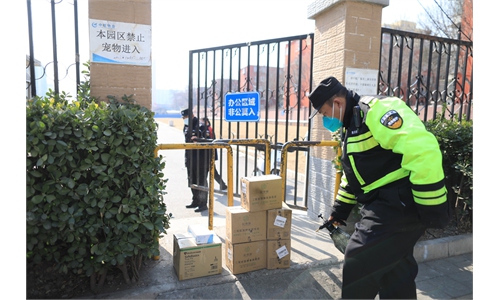COVID cases in China surge to recent high, but 'won't spread widely' thanks to immunization barrier

Residents in North China's Tianjin Municipality undergo nucleic acid testing in an orderly manner. Tianjin reported 12 confirmed cases on March 9, 2022. Photo: VCG
China's latest round of COVID-19 outbreaks has seen the number of local infections on the rise, involving over 20 provincial-level regions, and the number of daily new cases including asymptomatic infections has exceeded 500 for three consecutive days so far this month in the mainland.
Officials on Tuesday reported 233 locally transmitted cases and 322 asymptomatic carriers in the Chinese mainland, the National Health Commission (NHC) said. The local cases hit a new record of the latest wave. Among these cases, 94 were found in Northeast China's Jilin Province, 59 in East China's Shandong Province, and 17 in Northwest China's Shaanxi Province.
Amid this wave, the proportion of lower respiratory tract infections and fever decreased, and the morbidity rate also decreased. Notably, the number of local asymptomatic infections exceeded 300 for three consecutive days.
According to Shanghai health authorities, COVID-19 cases found in the city since March were the Omicron variant, with mild or no symptoms. Infections in Changchun, Jilin Province, were found to be caused by the Omicron variant after completing genome sequencing of 11 cases, the local authorities said on Wednesday.
"The Omicron variant has the nature of spreading faster and causing fewer serious illnesses, which is one of the reasons why there have been so many asymptomatic cases found recently," Yang Zhanqiu, a professor of the pathogen biology department at Wuhan University, told the Global Times on Wednesday.
Wu Fan, deputy dean of the Shanghai Medical College of Fudan University, said that in addition to the nature of the mutant strain, the proportion of asymptomatic infections will increase as a result of mass vaccination and enhanced immunity of the population, Wu said.
Over 3.16 billion COVID-19 vaccine doses had been administered in the Chinese mainland as of Monday, the NHC said on Tuesday.
Mass vaccination has helped in building an immunity barrier. People's resistance to the virus will increase, Yang said, noting that it's unlikely for this wave of the outbreak to spread widely.
By putting people's lives first, China has upheld the "dynamic zero-COVID" policy to curb the epidemic. "Practice has proved that the policy is effective in fighting the virus," Yang said, noting that the authorities have focused on improved mechanisms to minimize the impact on people's daily lives, such as precise control and prevention.
The strategy of "dynamic zero-COVID" has been implemented in a clear manner, which shows more governance wisdom and diversity, Zhang Wenhong, head of the Center for Infectious Diseases with the Shanghai-based Huashan Hospital of Fudan University, wrote via Weibo on Monday.
The fight against the epidemic has entered a new stage, and it needs to avoid a one-size-fits-all approach or a "large-scale rebound" of the epidemic, Zhang noted.


